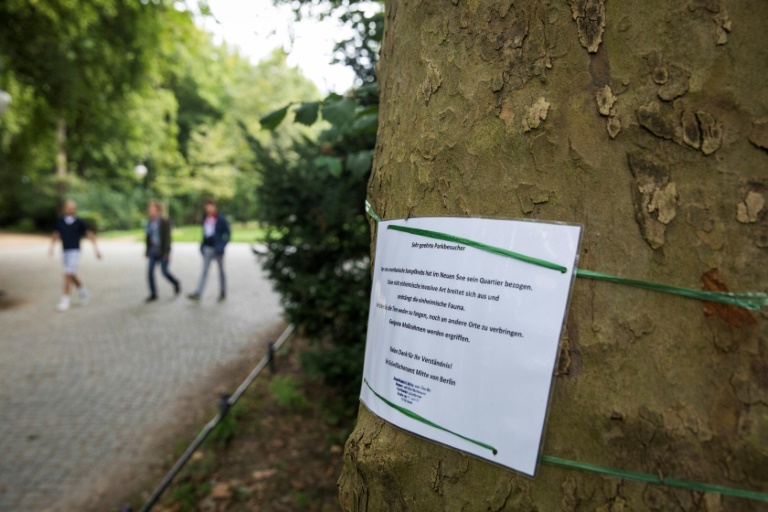In recent days, people strolling through the capital’s leafy Tiergarten park near Angela Merkel’s chancellery have reported spotting unusually large crabs, “lobsters” and even giant “scorpions”.
What they have witnessed, in fact, is an invasion of the red swamp crayfish (Procambarus clarkii) native to the southern United States and northern Mexico, say biologists.
The palm-sized critters have waved their claws at joggers, dog-walkers, cyclists and officials from nearby embassies and ministries.
Oliver Coleman, a crustaceans expert from Berlin’s Natural History Museum, suspects an aquarium owner dumped them in the park, which is already teeming with rabbits, foxes and the occasional wild pig.
He said many collectors value the freshwater crabs, also known as “Louisiana crayfish” or “mudbug”, for their deep red colour, “but usually not for very long”.
“After a while in a fish tank, they eat all the plants — and the aquarium quickly looks absolutely devastated.”
– ‘Invasion’ –

A placard warns of the proliferation of the ‘mudbug’ crabs at ‘Neuen See’ in Berlin
The species is considered a pest outside its natural environment, and wildlife workers and volunteers have started collecting them with nets, said Berlin city environment official Dirk Ehlert.
He said the crabs are usually rarely spotted because they tend to keep their heads below water in ponds and lakes. However, heavy rainfalls in recent weeks may have altered the water balance or drowned their caverns, he said.
Ecologists from non-profit environmental group NABU, who spotted six crabs outside the Spanish embassy this week, have another theory.
“Land migration is a strategy to settle new habitats,” the group says in a report, adding that the animals may be on the march “because of population pressures”.
Coleman agreed they are rapid breeders, telling AFP that “you only need one female with eggs, and the fight against the invasion is over”.
The crabs are a traditional delicacy in Louisiana, where “crawfish” are boiled with lemon, spices and vegetables, and they are farmed elsewhere in America, Europe and Asia.
Specialists warn about the damage it could cause to the ecosystems of the German capital
But Ehlert said German anti-poaching laws prohibit Berliners from catching them and throwing them on the barbecue.
The crab itself has no such qualms and eats the spawn of fish and amphibians, with potentially devastating consequences for local fauna, said NABU.
They can also out-perform native competitors in the search for food, and infect them with the crayfish plague fungus and other diseases.
NABU urged people to never release exotic species into the wild and warned that crabs must be “urgently prevented” from spreading further, especially into the city’s Spree and Havel river systems.
Ehlert, the Berlin city official, said perhaps nature itself may help stop the onward march of the mudbug.
“We are focusing on the natural enemies of the crabs,” he said, pinning hope especially on foxes and raccoons that have shown a preference for the creatures.
Download our app